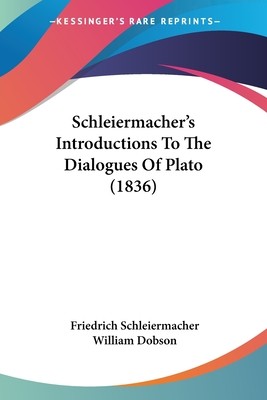
- We will send in 10–14 business days.
- Author: Friedrich Schleiermacher
- Publisher: Kessinger Publishing
- ISBN-10: 1437144705
- ISBN-13: 9781437144703
- Format: 15.2 x 22.9 x 2.3 cm, minkšti viršeliai
- Language: English
- SAVE -10% with code: EXTRA
Schleiermacher's Introductions To The Dialogues Of Plato (1836) (e-book) (used book) | bookbook.eu
Reviews
Description
Excerpt from book:NOTES. PHEDRUS. Page 72. Several of the conceptions in this Myth. I Cannot help maintaining what is here said, notwithstanding what Boeckh adduces (Heid. Jaiirb. i. 1). I can neither discover the coincidence with Philolaus, nor put such firm faith in the genuineness of the fragment ascribed to him. But this is a subject which can only be discussed in another place. P. 73- We are not to look for too much. Ast, in his commentary, has construed this passage very literally. It is, however, too profound for my apprehension how the poetic life above is indeed removed from all real representation of the true and beautiful, when below it forms the fourth kind of real life, and thus appears coordinate with the poetical and gymnastic life. Again, I know not in what sense a higher conception of the true and beautiful can be said to belong to the xprifnaTiiniKos than to the yeapyiKo?. And thus I leave it to others to enjoy this philosophy. LYSIS. P. 78. To have had the Lysis in his mind. Whoever reads, with a view to comparing the passages with this dialogue, Eth. Nicom. vin. c. 1. 2. 10. (p. 59- A.D. p. 63. B.) Magn. Mor. n. c. 11. (p. 111. E. and 112. C.) and Eudem. vn. 2. 5. (p. 162. B. C. p. 165. B. Ed. Casaub.1590.) will scarcely continue to doubt of this, although Aristotle neither names Plato nor the dialogue, and one might feel some suprise, if he really had it in view, that this is not done more frequently and thoroughly. But see the extract from Boeckh's Philolaus, p. 104. at the end of thisvolume. (Tr.) PROTAGORAS. P. 82. Perished. I learnt this from an investigation regularly instituted into this family by Heindorf out of the fourth speech of Andocides. Athenoeus, Deipnosophist. v. p. 218, does not adduce this authority, but only concludes fro...
EXTRA 10 % discount with code: EXTRA
The promotion ends in 22d.16:01:39
The discount code is valid when purchasing from 10 €. Discounts do not stack.
- Author: Friedrich Schleiermacher
- Publisher: Kessinger Publishing
- ISBN-10: 1437144705
- ISBN-13: 9781437144703
- Format: 15.2 x 22.9 x 2.3 cm, minkšti viršeliai
- Language: English English
Excerpt from book:NOTES. PHEDRUS. Page 72. Several of the conceptions in this Myth. I Cannot help maintaining what is here said, notwithstanding what Boeckh adduces (Heid. Jaiirb. i. 1). I can neither discover the coincidence with Philolaus, nor put such firm faith in the genuineness of the fragment ascribed to him. But this is a subject which can only be discussed in another place. P. 73- We are not to look for too much. Ast, in his commentary, has construed this passage very literally. It is, however, too profound for my apprehension how the poetic life above is indeed removed from all real representation of the true and beautiful, when below it forms the fourth kind of real life, and thus appears coordinate with the poetical and gymnastic life. Again, I know not in what sense a higher conception of the true and beautiful can be said to belong to the xprifnaTiiniKos than to the yeapyiKo?. And thus I leave it to others to enjoy this philosophy. LYSIS. P. 78. To have had the Lysis in his mind. Whoever reads, with a view to comparing the passages with this dialogue, Eth. Nicom. vin. c. 1. 2. 10. (p. 59- A.D. p. 63. B.) Magn. Mor. n. c. 11. (p. 111. E. and 112. C.) and Eudem. vn. 2. 5. (p. 162. B. C. p. 165. B. Ed. Casaub.1590.) will scarcely continue to doubt of this, although Aristotle neither names Plato nor the dialogue, and one might feel some suprise, if he really had it in view, that this is not done more frequently and thoroughly. But see the extract from Boeckh's Philolaus, p. 104. at the end of thisvolume. (Tr.) PROTAGORAS. P. 82. Perished. I learnt this from an investigation regularly instituted into this family by Heindorf out of the fourth speech of Andocides. Athenoeus, Deipnosophist. v. p. 218, does not adduce this authority, but only concludes fro...


Reviews